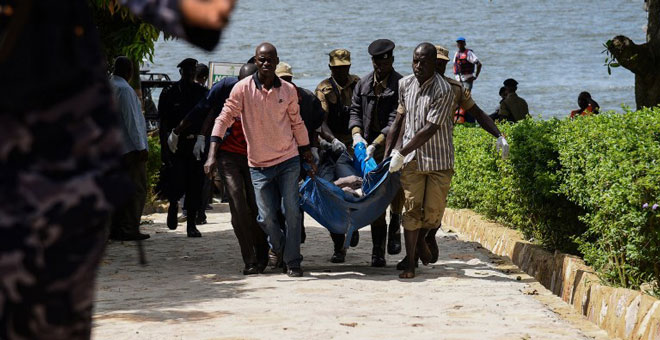
Marine safety concerns raised again as over 30 die on unsafe cruise boat
Kampala, Uganda | IAN KATUSIIME AND FLAVIA NASSAKA | On the evening of Nov. 24, news filtered through about a boat that had sunk on Lake Victoria. Nothing unusual, it appeared, since tiny rickety fishing vessels sink often on Ugandan lakes. But then a figure of over 120 people on board started being mentioned. Soon it was mentioned that this was in fact a cruise boat, ferrying revelers from one beach on the edges of Kampala City to another in neighbouringKyaggwe County in Mukono district. The boat sail normally takes 20 minutes. Sometimes, however, boat cruises stop in the middle of the lake for revelers to have more fun time. But this one did not make it.
By press time, two days later on Nov.26, up to 30 people; 15 male and 15 female, had been confirmed dead and the search for more bodies wasongoing. It was all guess work as no passenger manifest was made.It was also unclear if the boat, which keeled over the side before sinking, had trapped any passengers under it. That would take time to unravel because there appeared no plans to right or float the vessel.
Instead of facts and information, the government has responded to the tragedy with speculation, finger pointing, and wild promises of reforms.
It is now claimed that the boat was in poor mechanical condition and had been dry-docked for maintenance and that the organisers of the cruise defied a marine police order not to take to water on a suicidal late evening cruise.
None of this could be verified by press time. What is clear is that this was not an impromptu decision as the revelers included close-knit groups of Kampala city elite and appeared preplanned. Social media messages announcing it circulated well before the ill-fated evening.
Survivors’ tales
According to survivors, trouble started when the boat which had been sailing for some time, appeared to be hit by a strong wave.
According to one survivor’s tale, someone shouted “Balance the boat, balance the boat” over the public address system. It appeared that balancing the boat was complicated as people in the partying frenzy crowded to one side of the boat.
A fishing boat had detected danger and its occupants shouted that the cruise boat was sinking.
Some people agreed to be rescued on the small fishing boat. But, the survivor said, many were already intoxicated by the time the boat started filling with water, and many calls for safety went unheeded.
As the boat started rolling from side to side, and gushes of water made their way onto the boat deck, panic ensued. Pandemonium increased when a speaker blaring music fell into the water, followed by the generator, automatically killing the boat engine. All on board knew danger was imminent. The unnamed survivor says he told his friend “We are going to die.”
The boat with fishermen left with about 15 people and minutes later disaster struck. She says by the time they docked, they received news that the original boat had sunk.
When the boat capsized, it was survival for the fittest. Some good and strong swimmers dived for a nearby beach that is said to be about 100 metres from the scene of the accident. Most survivors say there were a few people with life jackets. But some of them drowned when desperate drowning passengers clung onto them. Some of the ordeal was captured in recordings. One can hear desperate cries as other smaller boats rushed in to rescue people. One of them, with most of a group of about 20 people who had crammed into it, sank.
Safety measures
John Opiro, the Managing Director, Kalangala Infrastructure Services (KIS) Limited which is one of the bigger marine operators, says these deaths could have been avoided if only the marine regulators were skilled. He says such a boat under proper circumstances should not have been allowed on the lake.
“You can’t use a fishing boat for a cruise. It’s not the kind where such happens. A fishing boat has different stability on the water because of the kind of load it carries. People spreading makes such a boat unstable”, he adds, “these deaths could have been easily avoided”.
Opiro says most of the staff at the Ministry of Works do not have the capability to identify whether a boat has a mechanical problem or not because they are not trained to do so. “There’s no training school for marines in the country,” he tells The Independent.
World over he says cruise liners earn big because boat cruises are one of the best tourist activities where people camp on boats for months having fun and clearly this boat was not fit for that purpose.
The ideal thing that should have been done in such a situation where the boat was in poor condition is issuing reserve boats to follow the main one to cater to any likely emergency.
Apart from over loading, the other consideration is how equipped the boat is for extreme weather.
Opiro stresses there should be a rigorous safety protocol that cruisers should go through. He says it matters how passengers are notified in case of an emergency and this also needs some form of training or expertise.
 The Independent Uganda: You get the Truth we Pay the Price
The Independent Uganda: You get the Truth we Pay the Price




hi!,I love your writing so a lot! percentage we keep in touch more approximately your article on AOL?
I need a specialist in this space to solve my problem.
Maybe that’s you! Looking forward to peer you.